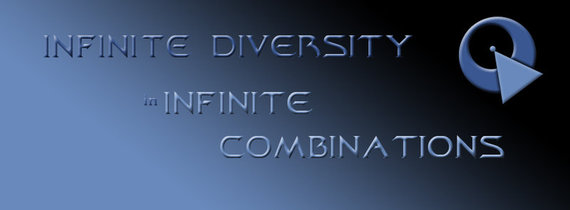Gene Roddenberry's original vision for Star Trek was of a time when humanity had solved its worst problems: poverty, intolerance, crime, disease, greed and war. Earth was a place of plenty and delight. Nobody used money anymore. "At a dark time in human history," wrote Arthur C. Clarke, "Star Trek promoted the then unpopular ideals of tolerance for differing cultures, and respect for all life-forms -- without preaching and always with a saving sense of humor."
Roddenberry had to compromise to get Star Trek on the air: sexy skirts, blazing phasers. But on some decisions he would not compromise: a black woman on the bridge, for example, a stand that brought approval from Martin Luther King Jr.
Keeping to the ideal of a better future, Roddenberry brought the values of diversity, peace, and exploration into his Star Trek: The Next Generation series as well. But when he died, those who took over promptly militarized the show. The Enterprise, "a ship of peace", according to Guinan (Whoopie Goldberg), took on layers of armor. In a gesture of contempt, the producer-heirs let an old Klingon bird of prey destroy D so they could make E a sleek warship. Had Star Trek: Nemesis not tanked at the box office, E would have been muscled up with even more arms and armor.
A red blindfold appeared over the eyes of the Roddenberry bust sitting on producer Rick Berman's desk. The peaceful ideal was abandoned, as foreshadowed perhaps in the episode "Yesterday's Enterprise," wherein an altered timeline makes the Enterprise a battleship and her crew soldiers instead of explorers, scientists, and family members. All the Star Trek spinoffs and film reboots kept to the new military mold.
In 2016, the announcement circulated about a new Star Trek TV series on CBS. "There is no better time," said CBS Television Studios president David Stapf, "to give Star Trek fans a new series than on the heels of the original show's 50th anniversary celebration." It is also an opportunity to place the series back on track in accord with Roddenberry's original dream for it.
Why does this matter? It matters because, in a world torn by strife and sexism, racism and ecocide, we desperately need visions of a better future. It doesn't matter that we know such visions to be fictional. All worthwhile projects begin in fantasy.
Even in a TV show, the sight of a truly multicultural cast of characters working together and enjoying each other's differences tells the world that such a possibility exists and is worth exploring. Hearing of a peaceful Earth stirs feelings of hope that our Earth can be peaceful too some day. As Roddenberry put it, "It is a terrible mistake to think that the future is somewhere off in a distant time. It is here -- in embryo. We are creating it right now, with the decisions we make about the environment, with the attitude we take toward space exploration, with the education we are giving our children." Healing of Earth begins with healing stories about how we live here as we contemplate the grandeur of the cosmos.
Perhaps the new series can take a new leaf from its creator's book: "We are on a journey to keep an appointment with whatever we are."

